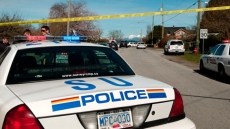VANCOUVER — The BC Centre on Substance Use is proposing a policy to sell legally regulated heroin as part of an urgent response to reduce opioid overdose deaths from a toxic drug supply that is profiting organized crime groups.
It is recommending the use of so-called heroin compassion clubs and buyers clubs, similar to those that emerged in the 1980s and 90s to allow access to medical cannabis in response to the AIDS epidemic.
"Then as now, compassion clubs functioned to provide a safe place for people to access medical cannabis and connect with a range of health services, while buyers clubs procured life-saving treatment for people living with HIV and AIDS when government inaction limited access to these medicines," a report from the centre says.
It also highlights independent reports that say organized crime groups have used Vancouver-area casinos to launder billions of dollars in cash from their proceeds of crime, including fentanyl trafficking, which Attorney General David Eby has said is troubling.
Dr. Evan Wood, executive director of the centre, said an innovative approach to the overdose crisis is needed during a public health emergency declared in British Columbia nearly three years ago and to wage "economic war" on organized criminals benefiting from drug prohibition.
The compassion clubs would involve a co-operative model through which powdered heroin would be restricted to members who have been assessed by a health-care provider as having an opioid addiction, provided education about not using alone and connected to treatment as part of a program involving rigorous evaluation, Wood said.
"One of the big benefits of this model is that there's just a massive chasm between where people buy their drugs and public health and treatment services and that's the gap that so far in the opioid response has been very, very difficult to bridge with people using at home alone and dying of fentanyl overdoses."
The BC Coroners Service has said nearly 3,000 people fatally overdosed in the province in 2017 and 2018 alone, with illicit fentanyl detected in 85 per cent of the deaths last year.
The heroin compassion-club model would require the approval of Health Canada, which could either provide an exemption to the Controlled Drugs and Substances Act for research or public health reasons or through another regulation that has allowed B.C. to import injectable pharmaceutical-grade heroin from Switzerland.
That heroin has been in use since 2014 for a limited number of drug users being treated at the Crosstown Clinic in Vancouver.
Wood said the idea for the compassion clubs came from a small group of people who banded together to buy heroin from dealers and test it to determine if it had been contaminated with fentanyl.
"I've seen and talked to these individuals," he said. "I've had a patient who had a transformative experience with using heroin instead of fentanyl and so it's led us to sit around a room and say, 'OK, maybe we need to have this conversation on regulating the heroin market.' "
Providing users with a regulated and legal supply of heroin would also ensure they get other supports including public health experts, treatment and pharmacy services, Wood said.
Dean Wilson, a former heroin addict and peer-support worker for the BC Centre on Substance Use, said he started using heroin at age 13.
"Not a day goes by that I don't wish I hadn't touched the stuff," said Wilson, who's been on treatment using the opioid methadone for over a decade.
Wilson, 63, an author of the centre's report, said he sold drugs and spent time in jail, including for property crimes, to feed his drug habit.
A gram of heroin on the street costs between $140 to $200 and can last a couple of days, versus about $3.80 that users would pay for powdered heroin imported from Switzerland, he said.
"That's the thing people don't realize, that if you had the same gram of heroin from the street you're looking at about $6,000 a month. But everybody has to steal or generate almost $50,000 of stolen property to get that $6,000."
Erica Thomson, a peer support worker for Fraser Health who also contributed to the report, said she began using heroin at age 15 while growing up as a national competitive swimmer.
She went through several treatment programs but repeatedly relapsed before starting her recovery eight years ago.
"I think this is another way that we're starting to stay alive because we're not getting anything practical that reflects our realities available to us," she said.
Thomson said drug users don't want to navigate organized crime groups to find a safe supply of heroin that compassion clubs would provide.
"You can upscale addiction treatment all you want but addiction treatment isn't the answer to a poisoned, unregulated, illicit drug market. Right now it's really about stopping the bleed."




